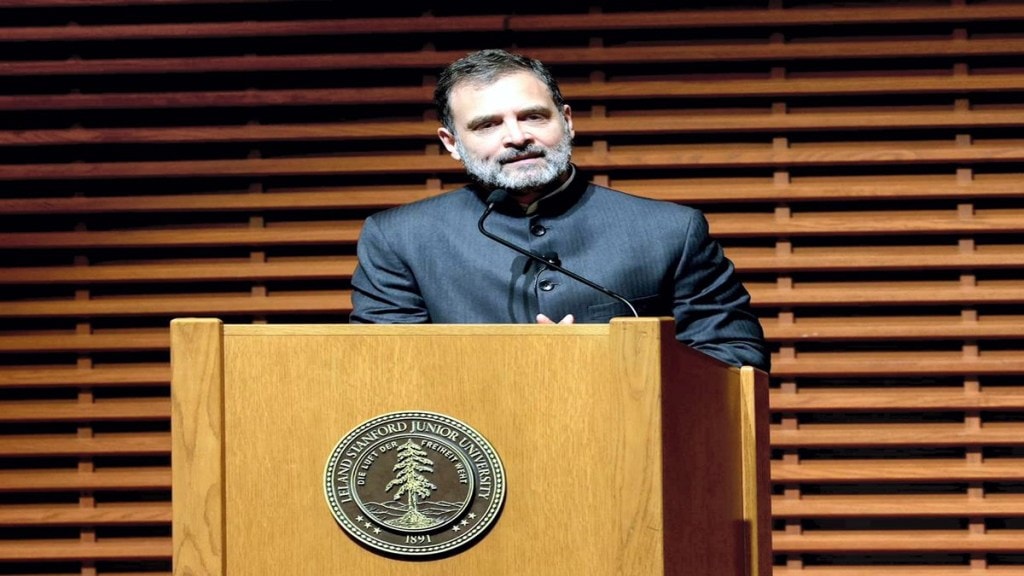Congress leader Rahul Gandhi, speaking at the prestigious Stanford University Campus in California, on Wednesday night said that when he joined politics he never thought that his disqualification as a Member of the Parliament (MP) was possible, however, it gave him a “huge opportunity” to serve people.
The 52-year-old leader, who is on a three-day US tour, said that when he joined politics in 2000, he never imagined that something like a disqualification was possible.
“But then I think it’s actually given me a huge opportunity. Probably much bigger than the opportunity I would have. That’s just the way politics works,” he said.
Gandhi was disqualified from the Lok Sabha as an MP after he was convicted in a criminal defamation case over his ‘Modi surname’ remarks in March.
“I think the drama started really, about six months ago. We were struggling. The entire opposition is struggling in India. Huge financial dominance. Institutional capture. We’re struggling to fight the democratic fight in our country,” he said, adding that at this point in time, he decided to go for the ‘Bharat Jodo Yatra’.
“I am very clear, our fight is ours fight,” he said. “But there is a group of young students from India here. I want to have a relationship with them and want to talk to them. It’s my right to do it,” he said during his interaction with Indian students and academicians of Indian origin at the Stanford University.
Rahul Gandhi on India- China relation
On a question over the India-China relation in the next 5-10 years, Gandhi replied saying that “it is tough right now”.
“I mean, they’ve occupied some of our territory. It’s rough. It’s not too easy (a relationship). India cannot be pushed around. That something is not going to happen,” Gandhi said.
Gandhi also supported New Delhi’s policy of having its relationship with Russia in the context of the Ukrainian war, despite the pressure it feels from the West. On being asked if he supports India’s neutral stance on Russia, “ We have a relationship with Russia, we have certain dependencies on Russia. So, I would have a similar stance as the Government of India.”
“At the end of the day, India has to look for its own interest. India, he said, is a big enough country whereby it generally will have relationships with other countries. It’s not so small and dependent that it will have a relationship with one and nobody else, he added.
“We will always have these types of relationships. We will have better relationships with some people, evolving relationships with other people. So that balance is there,” the former Congress president said.
Rahul Gandhi on AI, Pegasus at Stanford
Gandhi had spent the first half of his day with Silicon Valley-based startup entrepreneurs.
Sitting in the front row of the Plug and Play auditorium along with Indian Overseas Congress chairperson Sam Pitroda and some other key aides who have been travelling with him from India, Gandhi was seen engrossed in the panel discussion of experts on various aspects of artificial intelligence, big data, machine learning and their implications on mankind in general and on issues like governance, social welfare measures and also disinformation and misinformation.
“If you want to spread any technology in India, you have to have a system where power is relatively decentralized,” Gandhi said, in response to a question and then went on to share with the select group of invited entrepreneurs about his personal experience of drone technology and its regulation, which, according to him, “faced massive bureaucratic hurdles”.
Data, Gandhi said, is the new gold and countries like India have realized the real potential of it. “There is need to have appropriate regulations on data safety and security”.
Gandhi also said that he is not worried about the Pegasus spyware and similar technologies.
At one point of time he said he knows his phone is being tapped. And jokingly said, “Hello! Mr Modi” on his iPhone.
“I presume my iPhone is being tapped. You need establish rules with regard to privacy of data information as a nation and also as an individual,” he said.
“If a nation state decides that they want to tap your phone, no one can stop you. This is my sense,” he said.
“If the nation is interested in tapping phone, then this is not a battle worth fighting. I think whatever I do and work, is available to the government,” he claimed.
(With inputs from PTI)

